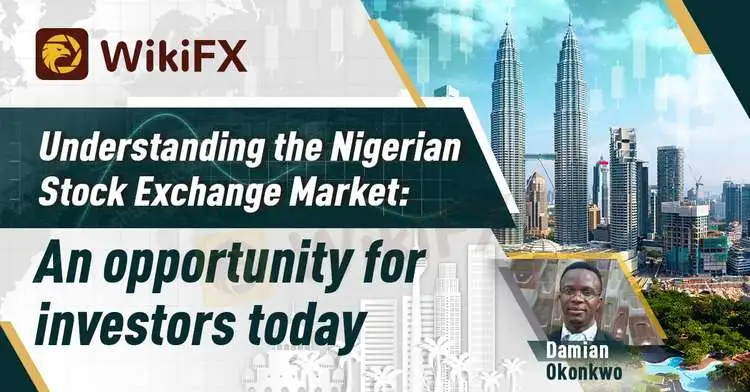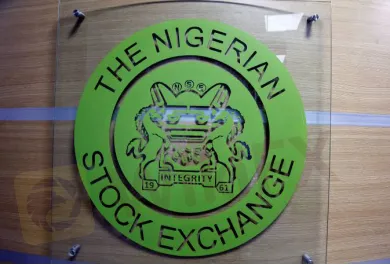简体中文
繁體中文
English
Pусский
日本語
ภาษาไทย
Tiếng Việt
Bahasa Indonesia
Español
हिन्दी
Filippiiniläinen
Français
Deutsch
Português
Türkçe
한국어
العربية
Understanding the Nigerian Stock Exchange Market: An opportunity for investors today
Abstract:The Nigerian Stock Exchange (NSE) was founded just a year after her independence in the year 1961. The first stock exchange market was established in Lagos. From here it spread to other parts of the country. As of today, over 4,900 companies have been listed on the NSE. On the Fixed Income market, the NSE has over 96 FGN bonds, 31 state bonds, 34 corporate bonds, 2 supranational bonds, and 53 memorandum listings.

By: Damian Okonkwo
Meaning of Stock Exchange Market
The stock exchange market is a centralized market where securities, such as company's stocks are bought as investments by individuals including the government in the hope of receiving higher returns as the company's network and stock value appreciates. When an individual purchases a company's stock, he becomes a legal shareholder in the company and is eligible to claim part of the company's residual assets and earnings based on the point he purchased. Stocks and shares are synonyms used interchangeably.
The stock exchange does not own shares any shares rather it acts as a market platform where stock buyers easily connect with stock sellers making buying and selling of stocks easy and reliable.
With the advancements in technology today, buyers and sellers no longer need to visit the open market to buy stocks but can simply do so from the comfort of their homes. This is made possible through stockbrokers.

How does the Nigerian Stock Exchange Market operate?
The Nigerian Stock Exchange Market runs an Automated Trading System (ATS) which was established by the Nigerian government on April 27, 1999. The ATS connects buyers with sellers and dealers through a computer network also known as Electronic Communication Network (ECN).
What are the trading hours for the Nigerian Stock Exchange Market?
The Nigerian Stock Exchange Market is every day from Monday to Friday at 9.30 a.m and closes at 2.30 p.m. Traders are free to carry out their transactions during these hours.
How can one Find the prices of different companies' stocks to purchase?
The Market prices of the stocks for all the companies listed on the NSE alongside an All-Share Index, NSE 30, and Sector Indices, are published daily in The Stock Exchange Daily Official List and also on the Nigerian Stock Exchange CAPNET (an intranet facility). Recommendations on the best stocks to buy can be found on the Wikifx.com website.
Who regulates the Nigerian Exchange Market?
The Nigerian Exchange Market is regulated by the Security and Exchange Commission (SEC) and supervised by the Federal Ministry of Finance.
Nevertheless, it is important to note that the stocks sold at the Nigerian Stock Exchange (NSE) are privately owned and regulated by the owners. The SEC only supervise the NSE to ensure that various companies fulfill their mandate to the shareholders. They protect the investors from fraud and bridge of trust.

Disclaimer:
The views in this article only represent the author's personal views, and do not constitute investment advice on this platform. This platform does not guarantee the accuracy, completeness and timeliness of the information in the article, and will not be liable for any loss caused by the use of or reliance on the information in the article.
Related broker
Read more

CME International Records a Massive Jump in Forex Volumes
CME International recorded a record surge in its foreign exchange trading volumes during the second quarter. Check out its performance across products and markets.

New to Forex Trading in India? Here's How You Can Start and Maximize
Want to begin your forex trading journey in India? Here's a guide that will help you open and close trading positions effectively, resulting in enhanced returns and minimized risks.

Revealing Factors That Help Determine the Gold Price in India
Want to know why gold prices differ from one place to another in India? It's because of these top reasons. Read this interesting gold story.

How to Find the Most Reliable Forex Broker for Trading in 2025
Learn what makes a forex broker reliable in 2025. Explore key features like fast execution, tight spreads, and transparent pricing for smarter trading decisions.
WikiFX Broker
Latest News
What is a Pip in Forex?
xChief: A Closer Look at Its Licenses
FXTRADING.com: A Closer Look at Its Licenses
New to Forex Trading in India? Here's How You Can Start and Maximize
Intel spins out AI robotics company RealSense with $50 million raise
Tom Lee's Granny Shots ETF is crushing the market and raking in cash
Risk Involved with Cabana Capital – Every Trader Should Know
XTB Hack 2025: Major Security Breach Exposes Client Accounts
Nvidia's Jensen Huang sells more than $36 million in stock, catching up with Warren Buffett in net worth
These are America's 10 weakest state economies most at risk in a recession
Currency Calculator


